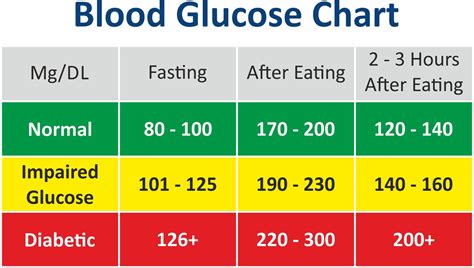Intro
Discover normal glucose levels, including fasting and post-meal targets. Learn about ideal blood sugar ranges, glucose monitoring, and maintaining healthy levels to prevent diabetes and related complications.
Maintaining normal glucose levels is crucial for overall health and well-being. Glucose, a type of sugar, is the primary source of energy for the body's cells. When glucose levels are within a normal range, the body functions optimally, and the risk of developing chronic diseases like diabetes and heart disease is minimized. Normal glucose levels are essential for preventing complications such as nerve damage, kidney disease, and vision problems. In this article, we will delve into the importance of normal glucose levels, the factors that influence them, and provide guidance on how to maintain a healthy glucose level.
The human body has a complex system for regulating glucose levels, involving the pancreas, liver, and hormones like insulin and glucagon. When we eat, our body breaks down carbohydrates into glucose, which is then absorbed into the bloodstream. The pancreas releases insulin, a hormone that facilitates the entry of glucose into cells, where it is used for energy production or stored for future use. On the other hand, when glucose levels drop, the pancreas releases glucagon, which stimulates the liver to release stored glucose into the bloodstream. This delicate balance is essential for maintaining normal glucose levels.
Understanding normal glucose levels is vital for individuals with diabetes or those at risk of developing the condition. Normal glucose levels vary throughout the day, depending on factors like meal times, physical activity, and sleep patterns. For individuals without diabetes, normal glucose levels are typically between 70 and 99 mg/dL (milligrams per deciliter) when fasting and less than 140 mg/dL two hours after eating. For those with diabetes, the target glucose levels may vary depending on the type of diabetes, medication, and other factors. It is essential to work with a healthcare provider to determine individualized glucose targets and develop a plan to achieve and maintain them.
Importance of Normal Glucose Levels

Factors That Influence Glucose Levels
Several factors can influence glucose levels, including diet, physical activity, stress, and sleep patterns. A diet high in refined carbohydrates, sugar, and saturated fats can cause glucose levels to spike, while a diet rich in whole foods, fruits, and vegetables can help regulate glucose levels. Regular physical activity, such as walking or jogging, can improve insulin sensitivity, reducing the risk of developing insulin resistance and type 2 diabetes. Stress and lack of sleep can also disrupt glucose levels, making it essential to manage stress through techniques like meditation or yoga and prioritize getting adequate sleep each night.How to Maintain Normal Glucose Levels

Benefits of Maintaining Normal Glucose Levels
Maintaining normal glucose levels has numerous benefits, including: * Reduced risk of developing chronic diseases like diabetes and heart disease * Improved energy levels and reduced fatigue * Enhanced mental clarity and focus * Better mood and reduced risk of depression * Improved sleep quality and duration * Reduced risk of complications like nerve damage, kidney disease, and vision problemsMonitoring Glucose Levels

Interpreting Glucose Test Results
Interpreting glucose test results requires understanding the different glucose levels and what they mean. Here are some general guidelines: * Normal glucose levels: less than 100 mg/dL (fasting) and less than 140 mg/dL (two hours after eating) * Impaired glucose tolerance: 100-125 mg/dL (fasting) and 140-199 mg/dL (two hours after eating) * Diabetes: 126 mg/dL or higher (fasting) and 200 mg/dL or higher (two hours after eating)Managing High Glucose Levels

Preventing Low Glucose Levels
Preventing low glucose levels (hypoglycemia) is essential for maintaining normal glucose levels and preventing complications. Here are some tips to help prevent low glucose levels: * Eat regular meals and snacks to maintain stable glucose levels * Choose complex carbohydrates like whole grains, legumes, and nuts * Avoid skipping meals or delaying eating * Monitor glucose levels regularly and adjust treatment as needed * Carry a glucagon emergency kit or fast-acting carbohydrates like glucose tablets or juiceConclusion and Next Steps

What are normal glucose levels?
+Normal glucose levels are typically between 70 and 99 mg/dL (milligrams per deciliter) when fasting and less than 140 mg/dL two hours after eating.
How can I maintain normal glucose levels?
+Maintaining normal glucose levels requires a multi-faceted approach that includes dietary changes, regular physical activity, stress management, and monitoring glucose levels.
What are the benefits of maintaining normal glucose levels?
+Maintaining normal glucose levels has numerous benefits, including reduced risk of developing chronic diseases like diabetes and heart disease, improved energy levels, and enhanced mental clarity and focus.
